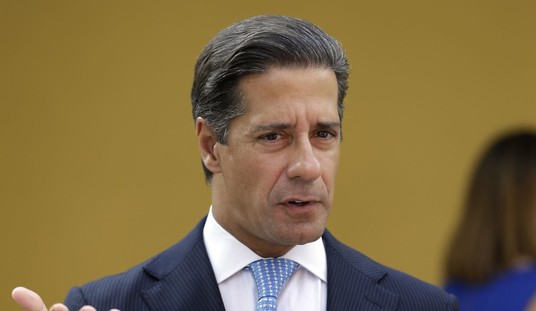Boris Johnson’s “final offer” on the Irish-backstop issue drew cautious praise and support from Tories, and widespread condemnation from Labour. However, it didn’t get much of a reaction at all from the players that will matter most to the UK prime minister. Neither Ireland nor the EU offered support for it, but they didn’t exactly reject it either … kind of.
They did sound “deeply skeptical” over prospects for a deal, as Reuters notes, but unlike previous rounds didn’t dismiss Johnson’s proposal out of hand either:
European Union officials expressed doubt on Thursday that the latest British proposals on Brexit could yield an agreement before an Oct. 31 deadline, with one saying Prime Minister Boris Johnson’s plan “can’t fly” as it stands.
But the bloc was careful not to dismiss the proposals too soon and both sides are treading carefully to avoid any blame should the tortuous divorce process end in a crash.
More talks between both sides’ Brexit negotiators are due on Friday but the bloc has already made it clear Johnson’s plans – which principally involve arrangements for the border between EU member Ireland and the British province of Northern Ireland – are nowhere close to unlocking a deal.
They can only be a starting point to more talks, according to officials and diplomats dealing with Brexit in EU hub Brussels.
Until now, the EU has mainly stuck to its guns on both the backstop and the Withdrawal Agreement that they reached with Theresa May. The UK had to guarantee no hard border in Ireland and no time limit on temporary workarounds, they have long insisted, and then accept that the EU had negotiated for three years and was not going to start all over with Johnson. Johnson used that to great effect in the UK, painting the EU as elitist and authoritarian while making the Brexit dispute a battle for populist democracy.
This time around, it appears that Johnson’s opponents want to deny him that battleground. Johnson’s stuck with a Parliament that wants more time to negotiate a deal, so the EU now seems to be playing along with that idea. Therefore, they’re being careful to treat Johnson’s proposal as an opening bid in a new round of talks rather than the ultimatum that Johnson is presenting. That could complicate Johnson’s insistence that the UK will leave the EU on Hallowe’en, especially given Parliament’s law that requires Johnson to seek a deal rather than exit without one. If the EU is still talking, Johnson’s defiance becomes less understandable.
It’s not that the EU really thinks that Johnson’s proposal is workable in any shape or form. As with other ideas that came from Johnson and his advisers, it creates the need for border checks within Ireland again, although somewhat more ambiguously than in previous proposals. It also contains a clause that would give the DUP a veto on any extension of a transition custom regime regardless of whether the border issue is permanently resolved, which had Northern Ireland opposition parties screaming foul.
Behind the scenes, Johnson’s proposal didn’t move the needle at all, the Guardian reports:
Boris Johnson appears to be fighting a losing battle to avoid Britain staying in the European Union beyond 31 October after Michel Barnier privately gave a scathing analysis of the prime minister’s new plan for the Irish border, describing it as a trap.
The European commission also refused to go into the secretive and intensive “tunnel” talks with the UK’s negotiators before a crunch summit on 17 October from which the UK had hoped to deliver a breakthrough deal.
Despite concerted attempts to avoid publicly trashing the UK proposals, there was dismay behind the scenes in Brussels after Johnson tabled his first concrete proposal for replacing the Irish backstop. …
But the UK has also requested that both sides commit at treaty level “never to conduct checks at the border” even if Stormont vetoes the arrangements laid out in the new 44-page Irish protocol.
Barnier said that this commitment would prevent Brussels from protecting its internal market if the Northern Ireland assembly blocked the arrangement in 2020 or at a later date.
“The EU would then be trapped with no backstop to preserve the single market after Brexit,” he warned, according to someone present in the room.
Ireland appears to have reached the same conclusion, both about the proposal and the strategy going forward. Irish Taoiseach Leo Varadkar called Johnson to tell him that his government would give the proposal further study, but ….
During a 30-minute phonecall, Mr Varadkar promised to “further study” the UK documents given to the EU today.
But there is a real sense that European leaders are only trying to be seen as reasonable rather than a Brexit breakthrough.
The Taoiseach told Boris Johnson tonight that the proposals “do not fully meet the agreed objectives of the backstop”.
What’s next? Johnson had to hope that the EU and Ireland would either have rejected the proposal out of hand, or accepted it as an ultimatum to prevent a no-deal Brexit. Johnson could have benefited politically either way. Had they accepted his proposal, Johnson would have been credited with undoing the Gordian diplomatic knot of Brexit. Rejecting it outright would have strengthened Johnson’s hand with Parliament ahead of a no-deal Brexit, with Johnson painting himself as the aggrieved party and using the EU and Ireland as his punching bag.
This concerted non-reaction leaves Johnson punching air, at least for the moment. Johnson can claim a small win in pushing the EU and Ireland off its no-further-negotiations perch, but that leads back to Parliament’s insistence that Johnson keep negotiating rather than exit on October 31 as he wants. The EU wants that time to keep the hard border from rising in Ireland, and may want elections in the UK to see if they can get a better negotiating partner from it. However, it’s tough to see the EU maintaining this non-response position for long enough to get through to an extension of Article 50, given the stakes involved in a no-deal Brexit on all sides.








Join the conversation as a VIP Member